新目标初中英语教材语法目录(7-9年级)
《新目标》教材重点语法的分布情况
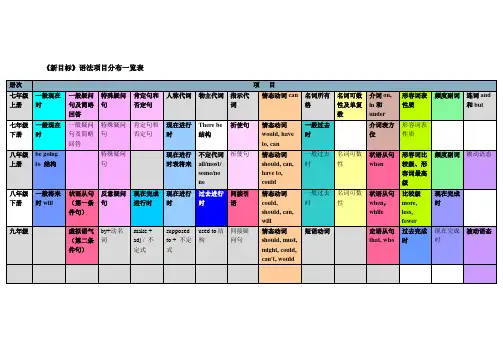
册次
项目
七年级上册
一般现在时
一般疑问句及简略回答
特殊疑问句
肯定句和否定句
人称代词
物主代词
指示代词
情态动词can
名词所有格
名词可数性及单复数
介词on, in和under
形容词表性质
频度副词
连词and和but
七年级下册
一般现在时
一般疑问句及简略回答
特殊疑问句
肯定句和否定句
现在进行时
英语课程标准(初中)所列语法项目
七年级上册
七年级下册
八年级上册
八年级下册
九年级〔整体〕
未集中出现
可数名词及其单复数
*
不可数名词
*
专有名词
*
名词所有格
*
人称代词
*
物主代词
*
反身代词
*
指示代词
*
不定代词
*
疑问代词
*
基数词
*
序数词
*
介词和介词短语
*
连词
*
形容词(比较级和最高级)
*
副词(比较级和最高级)
*
冠词
*
动词的基本形式
*
系动词
*
及物动词和不及物动词
*
助动词
*
情态动词
*
陈述句
*
一般疑问句
*
特殊疑问句
*
选择疑问句
*
附加(反意)疑问句
*
祈使句
*
感叹句
*
一般现在时
*
一般过去时
*
一般将来时
*
现在进行时
7-9年级语法点
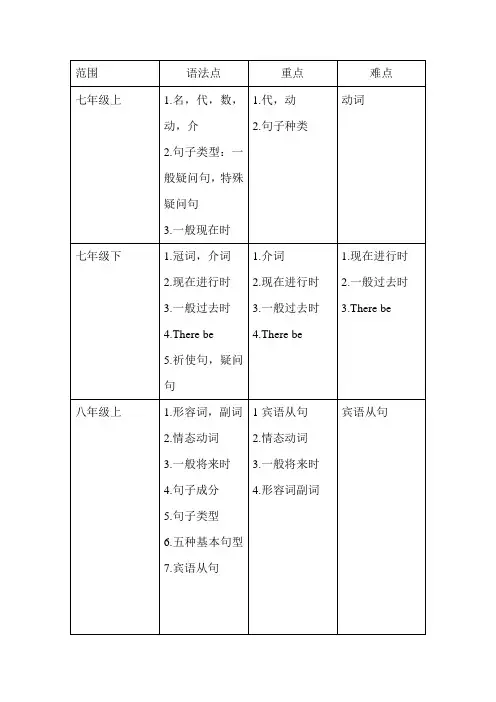
范围语法点重点难点
七年级上 1.名,代,数,
动,介
2.句子类型:一
般疑问句,特殊
疑问句
3.一般现在时1.代,动
2.句子种类
动词
七年级下 1.冠词,介词
2.现在进行时
3.一般过去时
4.There be
5.祈使句,疑问
句1.介词
2.现在进行时
3.一般过去时
4.There be
1.现在进行时
2.一般过去时
3.There be
八年级上 1.形容词,副词
2.情态动词
3.一般将来时
4.句子成分
5.句子类型
6.五种基本句型
7.宾语从句1宾语从句
2.情态动词
3.一般将来时
4.形容词副词
宾语从句
八年级下 1.一般将来时
2.过去进行时
3.现在完成时
4.附加疑问句
5.直接引语间接
引语
6.状语从句1.一般将来时
2.过去进行时
3.现在完成时
1.直接引语,间
接引语
2.状语从句
九年级 1.不定代词
2.过去完成时
3.非谓语动词
4.被动语态
5.定语从句
6.构词法1.过去完成时
2.非谓语动词
3.被动语态
定语从句。
人教版新目标英语七—九年级目录及要点
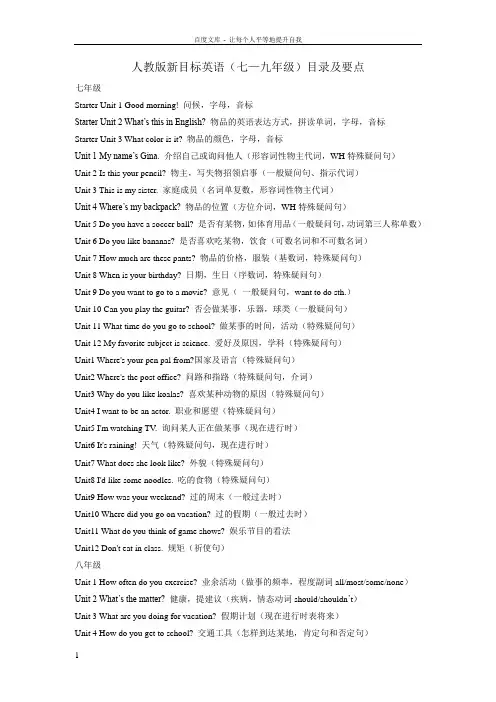
人教版新目标英语(七—九年级)目录及要点七年级Starter Unit 1 Good morning! 问候,字母,音标Starter Unit 2 What’s this in English? 物品的英语表达方式,拼读单词,字母,音标Starter Unit 3 What color is it? 物品的颜色,字母,音标Unit 1 My name’s Gina. 介绍自己或询问他人(形容词性物主代词,WH特殊疑问句)Unit 2 Is this your pencil? 物主,写失物招领启事(一般疑问句、指示代词)Unit 3 This is my sister. 家庭成员(名词单复数,形容词性物主代词)Unit 4 Where’s my backpack?物品的位置(方位介词,WH特殊疑问句)Unit 5 Do you have a soccer ball? 是否有某物,如体育用品(一般疑问句,动词第三人称单数)Unit 6 Do you like bananas? 是否喜欢吃某物,饮食(可数名词和不可数名词)Unit 7 How much are these pants? 物品的价格,服装(基数词,特殊疑问句)Unit 8 When is your birthday? 日期,生日(序数词,特殊疑问句)Unit 9 Do you want to go to a movie? 意见(一般疑问句,want to do sth.)Unit 10 Can you play the guitar? 否会做某事,乐器,球类(一般疑问句)Unit 11 What time do you go to school? 做某事的时间,活动(特殊疑问句)Unit 12 My favorite subject is science. 爱好及原因,学科(特殊疑问句)Unit1 Where's your pen pal from?国家及语言(特殊疑问句)Unit2 Where's the post office? 问路和指路(特殊疑问句,介词)Unit3 Why do you like koalas? 喜欢某种动物的原因(特殊疑问句)Unit4 I want to be an actor. 职业和愿望(特殊疑问句)Unit5 I'm watching TV. 询问某人正在做某事(现在进行时)Unit6 It's raining! 天气(特殊疑问句,现在进行时)Unit7 What does she look like? 外貌(特殊疑问句)Unit8 I'd like some noodles. 吃的食物(特殊疑问句)Unit9 How was your weekend? 过的周末(一般过去时)Unit10 Where did you go on vacation? 过的假期(一般过去时)Unit11 What do you think of game shows? 娱乐节目的看法Unit12 Don't eat in class. 规矩(祈使句)八年级Unit 1 How often do you exercise? 业余活动(做事的频率,程度副词all/most/some/none)Unit 2 What’s the matter?健康,提建议(疾病,情态动词should/shouldn’t)Unit 3 What are you doing for vacation? 假期计划(现在进行时表将来)Unit 4 How do you get to school? 交通工具(怎样到达某地,肯定句和否定句)Unit 5 Can you come to my party? 邀请(情态动词have to,现在进行时表将来)Unit 6 I’m more outgoing than my sister. 个性(人物的比较,形容词比较级)Unit 7 How do you make a banana milk shake? 饮食(祈使句,可数名词和不可数名词)Unit 8 How was your school trip? 曾经的旅行(一般过去时,过去时的肯定句和否定句)Unit 9 When was he born? 生日(when引导的状语从句,被动语态)Unit 10 I’m going to be a basketball player.人生目标(一般将来时going to)Unit 11 Could you please clean your room? 家务活(请求,情态动词could)Unit 12 What’s the best radio station?家乡(形容词最高级)Unit1Will people have robots? 预测(情态动词will)Unit2 What should I do? 建议(情态动词could, should, why don’t you)Unit3 What were you doing when the UFO arrived? 往事(状语从句,过去进行时)Unit4 He said I was hard-working. 转述他人的话(间接引语,一般过去时,过去进行时)Unit5 If you go to the party, you'll have a great time! 建议(条件状语从句,现在进行时表将来)Unit6 How long have you been collecting shells? 爱好(现在完成时,过去进行时)Unit7 Would you mind turning down the music? 请求(will表意愿,could表请求)Unit8 Why don't you get her a scarf? 送礼物提建议(现在完成时)Unit9 Have you ever been to an amusement park? 旅行(现在完成时,现在进行时表将来)Unit10 It's a nice day, isn't it? 谈话(反意疑问句)九年级Unit1 How do you study for a test? 学习(动词+by)Unit 2 I used to be afraid of the dark. 过去(used to)Unit 3 Teenagers should be allowed to choose their own clothes.规矩(should +be allowed to)Unit 4 What would you do? 兴趣和困境,提建议(should 提建议)Unit 5 It must belong to Carla. 野餐(must, might, could ,can’t)Unit 6 I like music that I can dance to. 音乐(that, who引导的状语)Unit 7 Where would you like to visit? 假期(表达愿望would, hope)Unit 8 I’ll help clean up the city parks.提供帮助(动词短语)Unit 9 When was it invented? 发明(被动语态)Unit 10 By the time I got outside, the bus had already left. 糟糕的日子(过去完成时)Unit 11 Could you please tell me where the restrooms are? 询问信息(间接引语)Unit 12 You’re supposed to shake hands.习俗(supposed to+不定式)Unit 13 Rainy days make me sad. 感觉(make sb. +定式,make sb.+形容词)Unit 14 Have you packed yet? 最近的假期(现在完成时with already and yet)Unit 15 We’re trying to save the manatees! 环保(复习句子的结构)。
(完整版)新版新目标英语七年级到九年级各单元话题和语法目录
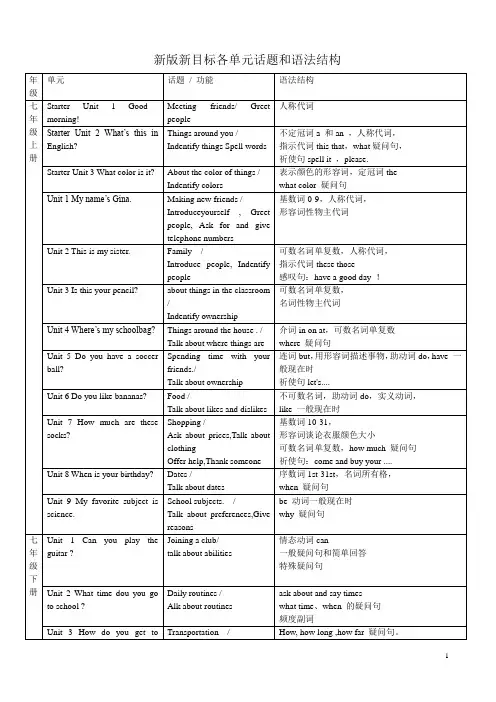
年级
单元
话题/功能
语法结构
七年级上册
Starter Unit 1 Good morning!
Meeting friends/ Greet people
人称代词
Starter Unit 2 What’s this in English?
Things around you/
Indentify things Spell words
不定冠词a和an,人称代词,
指示代词this that,what疑问句,
祈使句spell it,please.
Starter Unit 3 What color is it?
About the color of things/
Indentifycolors
Unit 2 This is my sister.
Family/
Introduce people, Indentify people
可数名词单复数,人称代词,
指示代词these those
感叹句:have a good day!
Unit 3 Is this your pencil?
about things in the classroom/
注意:
①主句是一般现在时态,宾语从句的时态不受其影响。
例句:He says I'm good at English now.
He says I was good at mathematics when I was young.
祈使句:come and buy your ....
Unit 8 When is your birthday?
Dates/
初中英语7-9年级下册超全语法梳理!(收藏)
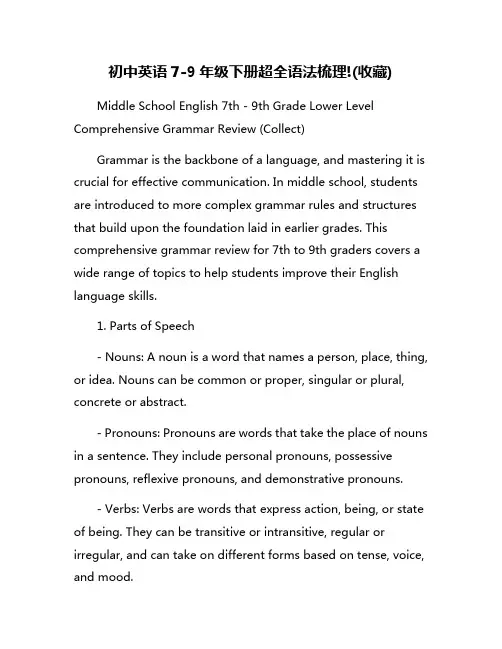
初中英语7-9年级下册超全语法梳理!(收藏)Middle School English 7th - 9th Grade Lower Level Comprehensive Grammar Review (Collect)Grammar is the backbone of a language, and mastering it is crucial for effective communication. In middle school, students are introduced to more complex grammar rules and structures that build upon the foundation laid in earlier grades. This comprehensive grammar review for 7th to 9th graders covers a wide range of topics to help students improve their English language skills.1. Parts of Speech- Nouns: A noun is a word that names a person, place, thing, or idea. Nouns can be common or proper, singular or plural, concrete or abstract.- Pronouns: Pronouns are words that take the place of nouns in a sentence. They include personal pronouns, possessive pronouns, reflexive pronouns, and demonstrative pronouns.- Verbs: Verbs are words that express action, being, or state of being. They can be transitive or intransitive, regular or irregular, and can take on different forms based on tense, voice, and mood.- Adjectives: Adjectives are words that describe or modify nouns. They can be used to indicate size, shape, color, age, personality, or origin.- Adverbs: Adverbs are words that modify verbs, adjectives, or other adverbs. They can indicate time, place, manner, degree, or frequency.- Prepositions: Prepositions are words that show the relationship between a noun or pronoun and other words in a sentence. Common prepositions include to, from, at, on, in, between, and among.- Conjunctions: Conjunctions are words that connect words, phrases, or clauses. They can be coordinating, subordinating, or correlative.- Interjections: Interjections are words that express strong emotions or feelings, such as wow, oh, yay, and ouch.2. Sentence Structure- Simple Sentences: A simple sentence consists of a single independent clause with a subject and a predicate.- Compound Sentences: A compound sentence consists of two or more independent clauses joined by a coordinating conjunction or a semicolon.- Complex Sentences: A complex sentence consists of one independent clause and one or more dependent clauses.- Compound-Complex Sentences: A compound-complex sentence consists of two or more independent clauses and one or more dependent clauses.3. Verb Tenses- Present Tense: The present tense is used to describe actions that are happening now or regularly.- Past Tense: The past tense is used to describe actions that have already occurred.- Future Tense: The future tense is used to describe actions that will happen in the future.- Present Perfect Tense: The present perfect tense is used to describe actions that started in the past and continue into the present.- Past Perfect Tense: The past perfect tense is used to describe actions that happened before another past action.- Future Perfect Tense: The future perfect tense is used to describe actions that will be completed by a specific time in the future.4. Subject-Verb Agreement- Singular Subjects: Singular subjects take singular verbs (e.g., He eats).- Plural Subjects: Plural subjects take plural verbs (e.g., They eat).5. Modifiers- Adjective Phrases: An adjective phrase is a group of words that function as an adjective to describe a noun or pronoun.- Adverb Phrases: An adverb phrase is a group of words that function as an adverb to modify a verb, adjective, or adverb.- Comparatives and Superlatives: Comparatives are used to compare two things, while superlatives are used to compare three or more things.6. Punctuation- Period: A period is used to end a declarative sentence.- Question Mark: A question mark is used to end an interrogative sentence.- Exclamation Point: An exclamation point is used to end an exclamatory sentence.- Comma: A comma is used to separate items in a list, join independent clauses, and set off introductory elements.- Apostrophe: An apostrophe is used to show possession or contraction.- Quotation Marks: Quotation marks are used to enclose direct speech or dialogue.7. Sentence Types- Declarative Sentences: Declarative sentences make a statement.- Interrogative Sentences: Interrogative sentences ask a question.- Imperative Sentences: Imperative sentences give a command or make a request.- Exclamatory Sentences: Exclamatory sentences express strong emotions or feelings.In conclusion, this comprehensive grammar review for middle school students covers a wide range of topics to help them improve their English language skills. By mastering the rules and structures of English grammar, students will be better equipped to communicate effectively and confidently in writtenand spoken English. Remember, practice makes perfect, so be sure to apply what you've learned in your everyday language usage. Happy learning!。
初中英语语法人教版教材语法目录
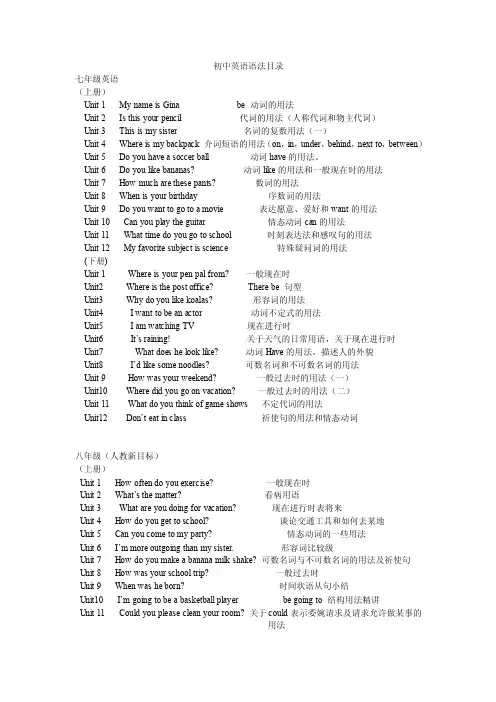
初中英语语法目录七年级英语(上册)Unit 1 My name is Gina be 动词的用法Unit 2 Is this your pencil 代词的用法(人称代词和物主代词)Unit 3 This is my sister 名词的复数用法(一)Unit 4 Where is my backpack 介词短语的用法(on,in,under,behind,next to,between)Unit 5 Do you have a soccer ball 动词have的用法。
Unit 6 Do you like bananas? 动词like的用法和一般现在时的用法Unit 7 How much are these pants? 数词的用法Unit 8 When is your birthday 序数词的用法Unit 9 Do you want to go to a movie 表达愿意、爱好和want的用法Unit 10 Can you play the guitar 情态动词can的用法Unit 11 What time do you go to school 时刻表达法和感叹句的用法Unit 12 My favorite subject is science 特殊疑问词的用法(下册)Unit 1 Where is your pen pal from? 一般现在时Unit2 Where is the post office? There be 句型Unit3 Why do you like koalas? 形容词的用法Unit4 I want to be an actor 动词不定式的用法Unit5 I am watching TV 现在进行时Unit6 It’s raining! 关于天气的日常用语,关于现在进行时Unit7 What does he look like? 动词Have的用法,描述人的外貌Unit8 I’d like some noodles? 可数名词和不可数名词的用法Unit 9 How was your weekend? 一般过去时的用法(一)Unit10 Where did you go on vacation? 一般过去时的用法(二)Unit 11 What do you think of game shows 不定代词的用法Unit12 Don’t eat in class 祈使句的用法和情态动词八年级(人教新目标)(上册)Unit 1 How often do you exercise? 一般现在时Unit 2 What’s the matter? 看病用语Unit 3 What are you doing for vacation? 现在进行时表将来Unit 4 How do you get to school? 谈论交通工具和如何去某地Unit 5 Can you come to my party? 情态动词的一些用法Unit 6 I’m more outgoing than my sister.形容词比较级Unit 7 How do you make a banana milk shake? 可数名词与不可数名词的用法及祈使句Unit 8 How was your school trip? 一般过去时Unit 9 When was he born? 时间状语从句小结Unit10 I’m going to be a basketball player be going to 结构用法精讲Unit 11 Could you please clean your room? 关于could表示委婉请求及请求允许做某事的用法Unit 12 What’s the best radio station? 形容词和副词的比较级和最高级(下册)Unit 1 Will people have robots? 一般将来时Unit 2 What should I do? 情态动词Unit 3 What were you doing when the UFO arrived? 过去进行时Unit 4 He said I was hard-working 直接引语和间接引语Unit 5 If you go to the party, you’ll have a great time! If 引导的条件状语与现在进行时表示将来的时间Unit 6 How long have you been collecting the shells? 现在完成进行时Unit 7 Would you mind turning down the music? 表示客气和委婉的请求的句型Unit 8 Why don’t you get her a scarf? 表示”提建议“的句子结构Unit 9 Have you ever been to an amusement park? 现在完成时态Unit 10 It’s a nice day, isn’t it? 反义疑问句九年级Unit 1 How do you study for a test? 特殊疑问词how的用法,表示通过用。
新目标初中英语教材知识结构汇总中考英语考查项目明细1
初中(新目标)英语教材知识全程一览表七年级总共27个单元:上册15个单元(其中3个预备单元),下册12个单元。
八年级总共22个单元:上册12个单元,下册10个单元。
九年级总共15个单元。
中考英语语法项目明细表一、语法项目表注:标*号的项目是八级要求,其余为五级要求。
二级语法项目暂不具体规定。
1、名词(1)可数名词及其单复数(2)不可数名词(3)专有名词(4)名词所有格2、代词(1)人称代词(2)物主代词(3)反身代词(4)指示代词(5)不定代词(6)疑问代词3、数词(1)基数词(2)序数词4、介词和介词短语5、连词6、形容词 (比较级和最高级)7、副词 (比较级和最高级)8、冠词9、动词(1)动词的基本形式(2)系动词(3)及物动词和不及物动词(4)助动词(5)情态动词10、时态(1)现在进行时(2)一般现在时(3)一般过去时(4)一般将来时(5)过去进行时(6)现在完成时*(7)过去完成时*(8)过去将来时11、被动语态(一般现在时,一般过去时,含有情态动词,一般将来时)12、非谓语动词(1)动词不定式 (全部掌握)*(2)动词的-ing形式*(3)动词的-ed形式13、构词法(1)合成法(2)派生法(3)转化法(4)缩写和简写14、句子种类(1)陈述句 (肯定式和否定式)(2)疑问句:一般疑问句、特殊疑问句、选择疑问句、反意疑问句(3)祈使句(4)感叹句15、句子成分(1)主语(2)谓语 (主谓一致)(3)表语(4)宾语 (直接宾语和间接宾语)*(5)补语(6)定语(7)状语16、简单句的基本句型(1)主语 + 系动词 + 表语(2)主语 + 不及物动词(3)主语 + 及物动词+宾语(4)主语 + 及物动词 + 间接宾语 + 直接宾语(5)主语 + 及物动词 + 宾语 + 宾语补足语(6)there be句型17、并列复合句18、主从复合句(1)宾语从句(2)状语从句(3)定语从句*(4)主语从句*(5)同位语从句*(6)表语从句19、直接引语与间接引语*20、省略*21、倒装*22、强调*23、虚拟语气。
新目标7-9年级英语知识点总结(新目标版九年级英语上册教案教学设计)
新目标7-9年级英语知识点总结(新目标版九年级英语上册教案教学设计)暑假英语辅导一、重点学习:(1)动名词放在句首作主语和跟在介词后作宾语的用法。
(2)动词不定式的用法(作后置定语的用法)。
(3)中考中what和how的区分考查。
(4)how提问方式状语,巩固how often , how soon, how long和how far的用法。
(5)重点短语和语法复习。
(1)动名词:放在句首作主语和跟在介词,及物动词后作宾语的用法。
动名词及其短语作主语谓语常用单数。
① (walk)after supper is good for our health.②We often learn English by (memorize) grammar. 介词:at, in , on, of , from, for, about, with, without, against , be used to 新目标英语常见跟doing的几种情形:⑴finish doing sth.完成做某事⑵practice doing sth 练习做某事⑶be worth doing sth 值得做某事⑷be busy doing sth忙于做某事⑸keep doing sth始终/一直做…⑹be used to doing sth习惯做某事⑺give up doing sth 放弃做某事⑻consider doing sth考虑做某事⑼suggest doing sth建议做某事⑽can’t help doing sth情不自禁做某事⑾feel like doing sth想要做某事⑿enjoy doing sth喜欢做某事⒀miss doing sth思念做某事⒁mind doing sth介意做某事⒂prefer doing sth to doing sth更喜欢做某事⒃look forward to doing sth 期望做某事⒄have a hard / good time (in) doing sth 愉快地做某事⒅spend … (in) doing sth⒆have trouble/ difficulty/ hard (in) doing sth费力地做某事⒇have fun (in) doing sth.(21)go swimming/ fishing/ camping/ trekking/ hiking/ shopping(22)do some reading/ cleaning/ writing/ listening(23)begin/ start to do sth.与 doing sthlove/ like/ hate to do sth 与 doing sthremember/ forget to do sth (中考点)与doing sthtry to do sth (中考点)尽力干某事与doing sth试着干某事stop to do sth停下来干某事与doing sth.停止干某事24. There be +名词+ doing sth (现在分词)25.感官动词hear , listen to, look at , see, watch, notice, find +宾语 + doing sth.(现在分词)1.Have you finished (copy)the new words ?2. He likes (play) soccer , this is his hobby.3. Schoolboys enjoy (play) computer games, while schoolgirls enjoy (chat) online.4. Would you mind (take) these books to the teachers’ office for me?5. The teacher kept the students (practice) exercises.6. We are busy (get) ready for the important exam these days.7. The girls do some (shop) every Sunday.8. Let’s go (swim) , shall we?9. This novel is worth (read).10. He spent twenty thousand yuan (spend) his holidayabroad.11. The pianist practices (play) the piano every night.12. He’s feeling sick. He doesn’t feel like (eat) or drinking anything.13. Thank you for (tell) me so much information.14. She prefers (dance) to (sing) a song.15. She dislikes (eat) meat, because she wants to be slim(苗条).16. Mrs Green hates (travel) by air. She always falls asleep during the flight.17. He started (learn) Chinese Kungfu at the age of five.18. When the teacher came in student all stopped (talk).19. They are having fun (make) model planes.20. Jim had trouble (learn) Chinese.21. (swim) is far more comfortable than (run) in hot summer.22. Edison’s father saw him (sit) on some eggs one day.23. Listen! Can you hear someone (hum) a song next door.24. I found him (lie) in bed, tired and pale(脸色苍白).25. The fans watched the soccer stars (practice) playing soccer yesterday afternoon.26. Little Tom was interested in (try) out his new ideas in his own lab.27. If you want to be healthy, you are supposed to give up (smoke).28. Are you for or against (stay) here for night?29. William Pan has got used to (live) in Amoy, look forward to (meet) him at Xiamen University.31. I remembered (lend) him a thousand yuan.新目标英语动词不定式的用法及固定结构(2)动词不定式的用法(作后置定语的用法)。
7至9年级英语主要语法
7至9年级主要语法一词类 1名词 n 2冠词art 3代词pron 4 形容词adj 5 数词num 6动词v 7副词adv 8介词prep 9连词conj 10感叹词interj1. 名词可数名词变复数直接加s,以辅音字母加y结尾的变y为i再加es,以s,x,ch,sh结尾的加es,以辅音字母结尾加o结尾的加es(但photo只加s),以fe或f结尾的变fe或f为v再加es ,(Chinese,Japanese,sheep单复数同形,people,police自带复数)不可数名词作主语谓语动词用单数名词所有格有生命的东西的所有格一般在名词后面加’s,但以s结尾的复数名词的所有格只在这个名词的后面加’ Tom’s book , teachers’ desk 无生命的东西的所有格用of连接 the legs of desk某个人或物属于几个人共同拥有的所有格,只在最后那个人后面加’s He is Tom and Jack’s father(father只有一个)某些人或物属于几个人分别拥有的所有格,就要每个人后面都要用所有格 they are Tom’s and Jack’s fathers.(father不只一个)2 冠词用不定冠词表数量“一”, 表一类人或物,不定冠词有"a和an"两种形式。
"a"用在以辅音开头的词前,"an"用在以元音开头的词前。
判断一个词是以元音开头还是以辅音开头,是根据读音而不是根据字母。
1. 用于可数名词的单数形式前,表示"一"There is a tiger in the zoo.动物园里有一只老虎。
2. 表示一类人和东西A tiger can be dangerous.老虎可能有危害性。
3. 表示"某一个"的意思A gentleman wants to see you.有一位先生要见你。
(完整版)初中英语语法目录
初中英语语法目录1.1 名词复数的规则变化 -------------------------------------------------- 11.2 其它名词复数的规则变化 ---------------------------------------------- 11.3 名词复数的不规则变化 ------------------------------------------------ 11.4 不可数名词量的表示 -------------------------------------------------- 21.5 定语名词的复数 ------------------------------------------------------ 31.6 不同国家的人的单复数 ------------------------------------------------ 31.7 名词的格 ------------------------------------------------------------ 42. 冠词和数词 ----------------------------------------------------------- 42.2 定冠词的用法 -------------------------------------------------------- 42.3 零冠词的用法 -------------------------------------------------------- 52.4 冠词与形容词+名词结构---------------------------------------------- 62.5 冠词位置 ------------------------------------------------------------ 62.6 数词 ---------------------------------------------------------------- 63. 代词 ----------------------------------------------------------------- 73.1 人称代词的用法 -------------------------------------------------------- 9 3.2 人称代词之主、宾格的替换 ---------------------------------------------- 9 3.3 代词的指代问题 ------------------------------------------------------ 10 3.4 并列人称代词的排列顺序 ---------------------------------------------- 10 3.5 物主代词 ------------------------------------------------------------ 10 3.6 双重所有格 ---------------------------------------------------------- 11 3.7 反身代词 ------------------------------------------------------------ 11 3.8 相互代词 ------------------------------------------------------------ 12 3.9 指示代词 ------------------------------------------------------------ 13 3.10 疑问代词----------------------------------------------------------- 14 3.11 关系代词----------------------------------------------------------- 15 3.12 every , no, all, both, neither, nor -------------------------------------------------------------- 16 3.13 none, few, some, any, one, ones ---------------------------------------------------------------- 16 3.14 代词比较辩异one,that 和it ------------------------------------------------------------------ 17 3.15 one/another/the other ---------------------------------------------------------------------------- 18 3.16 “ th的妙用------------------------------------------------------- 18 3.17 anyone/any one;no on e/non e;ev ery/ each ------------------------------------------- 1 8 3.18 both, either, neither, all, any, none ----------------------------------------------------------- 19 3.19 many, much ---------------------------------------------------------------------------------------- 203.20 few, little, a few, a little -------------------------------------------------------------------------- 204. 形容词和副词---------------------------------------------------------- 20 4.2以-ly结尾的形容词----------------------------------------------------- 21 4.3 用形容词表示类别和整体 ---------------------------------------------- 22 4.4 多个形容词修饰名词的顺序 -------------------------------------------- 22 4.5 副词及其基本用法 ---------------------------------------------------- 22 4.6 兼有两种形式的副词 -------------------------------------------------- 23 4.7 形容词与副词的比较级 ------------------------------------------------ 23 4.8 as + 形容词或副词原级+ as -------------------------------------------------------------------- 24 4.9 比较级形容词或副词+ than ------------------------------------------------------------------ 25 4.10 可修饰比较级的词 --------------------------------------------------- 254.11 many,old 和far ---------------------------------------------------------------------------------- 26 4.12 the + 最高级+ 比较范围---------------------------------------------- 264.13 和more 有关的词组---------------------------------------------- 275. 动词 ---------------------------------------------------------------- 27 5.1 系动词 ------------------------------------------------------------- 28 5.2 什么是助动词 -------------------------------------------------------- 29 5.3助动词be的用法------------------------------------------------------- 30 5.4 助动词have 的用法-------------------------------------------------- 30 5.5 助动词do 的用法---------------------------------------------------- 31 5.6 助动词shall 和will 的用法-------------------------------------------- 31 5.7 助动词should,would 的用法------------------------------------------- 32 5.8 短语动词 ----------------------------------------------------------- 325.9 非谓语动词 --------------------------------------------------------- 326. 动名词--------------------------------------------------------------- 336.2 worth 的用法-------------------------------------------------------- 337. 动词不定式----------------------------------------------------------- 34 7.2 不定式作补语 -------------------------------------------------------- 35 7.3 不定式主语 --------------------------------------------------------- 36 7.4 It's for sb. 和It's of sb. ---------------------------------------------------------------------------- 36 7.5 不定式作表语 -------------------------------------------------------- 37 7.6 不定式作定语 -------------------------------------------------------- 37 7.7 不定式作状语 -------------------------------------------------------- 37 7.8 用作介词的to --------------------------------------------------------------------------------------- 37 7.9 省to 的动词不定式--------------------------------------------------- 38 7.10 动词不定式的否定式 ------------------------------------------------- 38 7.11 不定式的特殊句型too …to ••- ---------------------------------------------------------------- 39 7.12 不定式的特殊句型so as to -------------------------------------------------------------------- 39 7.13 不定式的特殊句型Why not -------------------------------------------------------------------- 40 7.14 不定式的时态和语态 ------------------------------------------------- 407.15 动名词与不定式 ----------------------------------------------------- 408. 特殊词精讲----------------------------------------------------------- 41 8.2 forget doing/to do ---------------------------------------------------------------------------------- 41 8.3 remember doing/to do ---------------------------------------------------------------------------- 41 8.4 regret doing/to do --------------------------------------------------------------------------------- 42 8.5 cease doing/to do ---------------------------------------------------------------------------------- 42 8.6 try doing/to do -------------------------------------------------------------------------------------- 42 8.7 go on doing/to do ---------------------------------------------------------------------------------- 42 8.8 be afraid doing/to do ------------------------------------------------------------------------------ 42 8.9 be interested doing/to do ------------------------------------------------------------------------- 43 8.10 mean to doing/to do ----------------------------------------------------------------------------- 43 8.11 begin(start) doing/to do ----------------------------------------------------------------------- 438.12 感官动词+ doing/to do ------------------------------------------------------------------------- 439. 分词 ---------------------------------------------------------------- 44 9.2 分词作状语---------------------------------------------------------- 44 9.3 连词+分词(短语) --------------------------------------------------------------------------------- 45 9.4 分词作补语---------------------------------------------------------- 45 9.5 分词作表语---------------------------------------------------------- 459.7 分词的时态---------------------------------------------------------- 469.8 分词的语态---------------------------------------------------------- 4610. 独立主格------------------------------------------------------------ 4710.2 With 的复合结构作独立主格--------------------------------------------- 4711. 动词的时态---------------------------------------------------------- 48 11.2 一般过去时的用法 --------------------------------------------------- 49 11.3 used to / be used to ------------------------------------------------------------------------------ 50 11.4 一般将来时--------------------------------------------------------- 50 11.5 be going to / will ----------------------------------------------------------------------------------- 50 11.6 be to 和be going to ----------------------------------------------------------------------------- 51 11.7 一般现在时表将来 --------------------------------------------------- 51 11.8 用现在进行时表示将来 ----------------------------------------------- 51 11.9 现在完成时--------------------------------------------------------- 51 11.10 比较过去时与现在完成时-------------------------------------------- 51 11.11 用于现在完成时的句型---------------------------------------------- 52 11.12 比较since 和for ------------------------------------------------------------------------------- 53 11.13 since 的四种用法--------------------------------------------------- 54 11.14 延续动词与瞬间动词------------------------------------------------ 54 11.15 过去完成时-------------------------------------------------------- 54 11.16 用一般过去时代替完成时-------------------------------------------- 55 11.17 将来完成时-------------------------------------------------------- 55 11.18 现在进行时-------------------------------------------------------- 56 11.19 不用进行时的动词-------------------------------------------------- 56 11.20 过去进行时-------------------------------------------------------- 57 11.21 将来进行时-------------------------------------------------------- 57 11.22 一般现在时代替将来时---------------------------------------------- 57 11.23 一般现在时代替过去时---------------------------------------------- 58 11.24 一般现在时代替完成时---------------------------------------------- 58 11.25 一般现在时代替进行时---------------------------------------------- 58 11.26 现在进行时代替将来时---------------------------------------------- 58 11.27 时态一致---------------------------------------------------------- 5811.28 时态与时间状语---------------------------------------------------- 5812. 动词的语态--------------------------------------------------------- 59 12.1 let 的用法---------------------------------------------------------- 59 12.2 短语动词的被动语态 ------------------------------------------------- 59 12.3 表示" 据说" 或" 相信" 的词组--------------------------------------------- 59 12.4 不用被动语态的情况 -------------------------------------------------- 60 12.5 主动形式表示被动意义 ------------------------------------------------ 61 12.6 被动形式表示主动意义 ------------------------------------------------ 6112.7 need/want/require/worth ---------------------------------------------------------------------- 6113. 句子的种类----------------------------------------------------------- 61 13.1 祈使句结构---------------------------------------------------------- 63 13.2 感叹句结构---------------------------------------------------------- 63 13.3 强调句结构---------------------------------------------------------- 64 13.4 用助动词进行强调 ---------------------------------------------------- 65 13.5 反意疑问句---------------------------------------------------------- 6514.2 倒装句之部分倒装 ---------------------------------------------------- 68 14.3 以否定词开头作部分倒装 ----------------------------------------------- 69 14.4 so, neither, nor 作部分倒装 --------------------------------------------- 69 14.5 only 在句首要倒装的情况----------------------------------------------- 69 14.6 as, though 引导的倒装句 ---------------------------------------------- 7014.7 其他部分倒装-------------------------------------------------------- 7015. 主谓一致------------------------------------------------------------- 70 15.1 并列结构作主语时谓语用复数 ------------------------------------------- 71 15.2 主谓一致中的靠近原则 ------------------------------------------------ 71 15.3 谓语动词与前面的主语一致 --------------------------------------------- 71 15.4 谓语需用单数-------------------------------------------------------- 71 15.5 指代意义决定谓语的单复数 --------------------------------------------- 7215.6 与后接名词或代词保持一致 --------------------------------------------- 7216. 虚拟语气------------------------------------------------------------- 72 16.1 真实条件句---------------------------------------------------------- 73 16.2 非真实条件句-------------------------------------------------------- 73 16.3 混合条件句---------------------------------------------------------- 74 16.4 虚拟条件句的倒装 ---------------------------------------------------- 74 16.5 特殊的虚拟语气词:should ---------------------------------------------------------------------- 74 16.6 wish 的用法---------------------------------------------------------- 75 16.7 比较if only 与only if ----------------------------------------------------------------------------- 76 16.8 It is (high) time that ----------------------------------------------------------------------------- 7616.9 need "不必做"和"本不该做" ------------------------------------------------------------------ 7617. 名词性从句----------------------------------------------------------- 76 17.1 引导名词性从句的连接词 ----------------------------------------------- 76 17.2名词性that-从句-------------------------------------------------------- 77 17.3名词性wh-从句-------------------------------------------------------- 78 17.4 if, whether 引导的名词从句--------------------------------------------- 7817.5 否定转移 ------------------------------------------------------------ 7918. 定语从句------------------------------------------------------------- 80 18.1 关系代词引导的定语从句----------------------------------------------- 80 18.2 关系副词引导的定语从句----------------------------------------------- 80 18.3 判断关系代词与关系副词----------------------------------------------- 81 18.4 限制性和非限制性定语从句 -------------------------------------------- 81 18.5 介词+关系词------------------------------------------------------- 82 18.6 as, which 非限定性定语从句 ------------------------------------------- 82 18.7 先行词和关系词二合一 ------------------------------------------------ 83 18.8 what/whatever;that/what; who/whoever -----------------------------------------------------8318.9 关系代词that 的用法 ------------------------------------------------- 8319. 状语从句 ----------------------------------------------------------- 84 19.2 方式状语从句------------------------------------------------------- 84 19.3 原因状语从句------------------------------------------------------- 85 19.4 目的状语从句------------------------------------------------------- 85 19.5 结果状语从句------------------------------------------------------- 85 19.6 条件状语从句------------------------------------------------------- 8619.8 比较while, when, as -----------------------------------------------------------------------------87 19.9 比较until 和till ------------------------------------------------------------------------------------8719.10表示"一…就…"的结构 ------------------------------------------------ 8820.1 并列连词与并列结构 ------------------------------------------------- 89 20.2 比较and 和or -------------------------------------------------------------------------------------89 20.3 表示选择的并列结构 ------------------------------------------------- 90 20.4 表示转折或对比 ----------------------------------------------------- 90 20.5 表原因关系--------------------------------------------------------- 9020.6 比较so 和such -----------------------------------------------------------------------------------9121. 情态动词------------------------------------------------------------- 91 21.2 比较can 和be able to --------------------------------------------------------------------------91 21.3 比较may 和might -------------------------------------------------------------------------------92 21.4 比较have to 和must ----------------------------------------------------------------------------92 21.5 must 表示推测 ------------------------------------------------------ 92 21.6 表示推测的用法 ----------------------------------------------------- 93 21.7 情态动词+ have +过去分词-------------------------------------------- 94 21.8 should 和ought to --------------------------------------------------------------------------------94 21.9 had better 表示"最好" ---------------------------------------------------------------------------94 21.10 would rather 表示"宁愿" --------------------------------------------------------------------- 94 21.11 will 和would ------------------------------------------------------------------------------------- 95 21.12 情态动词的回答方式------------------------------------------------ 95 21.13 带to 的情态动词--------------------------------------------------- 96 21.14 比较need 和dare ------------------------------------------------------------------------------96。
- 1、下载文档前请自行甄别文档内容的完整性,平台不提供额外的编辑、内容补充、找答案等附加服务。
- 2、"仅部分预览"的文档,不可在线预览部分如存在完整性等问题,可反馈申请退款(可完整预览的文档不适用该条件!)。
- 3、如文档侵犯您的权益,请联系客服反馈,我们会尽快为您处理(人工客服工作时间:9:00-18:30)。
2.want to be的用法;
3. grow up, sure, send, able, mean,take up, agree, write down, have to do with…, begin等用法。
Unit 7
Will people have robots?
1.字母S - Z书写及发音;
2.识别颜色:What color is it? can, see, say等用法。
Unit 1
My name’s Gina?
1.人称代词及形容词性物主代词用法;
2.含有be动词的一般现在时用法;
3.自我介绍,问候他人及询问电话号码;too, and,friend等用法。
Unit 4
What’s the best movie theater?
1.形容词、副词最高级用法;
2.so far, have…in common, kind, be up to, play a role, make up, take…seriously等用法。பைடு நூலகம்
Unit 5
Do you want to watch a game show?
单元
语法内容
Unit 1
Where did you go on vacation?
1.一般过去时;
2.不定代词(someone, something, somewhere,)用法;
3.反身代词用法;
4. decide, try, dislike, seem,enough, difference, as等用法。
Unit 10
I’d like some noodles.
1.would like用法;2. some, any用法;
3. order, around the world, answer, different, if, get popular, cut up, bring good luck to等用法。
Unit 8
How do you make a banana milk shake?
1.可数名词&不可数名词;
2.由how much/how many引导的特殊疑问句;祈使句用法;
3.finally, first, next等表示顺序的副词用法;turn on, add, fill, cover等用法。
Unit 8
Is there a post office near here?
1.There be句型用法;
2.询问并回答方向;
3.方位介词;spend, enjoy等用法。
Unit 9
What does he look like?
1.询问外貌及性格的句型;
2.描述外貌及性格;
3. a little, another, in the end, be of medium build/height等用法。
Unit 10
If you go to the party, you’ll have a great time.
1.If引导的条件状语从句用法;
2.情态动词should用法;
3.宾语从句用法;
4.从属连词unless用法
5. advice, keep…to oneself, in half, make mistakes等用法。
七年级第二学期
单元
语法内容
Unit 1
Can you play the guitar?
1.情态动词can的用法;
2. play the guitar, play chess, speak, be good at, tell, show, talk, be good with, help, teach, on the weekend等用法。
1.一般将来时构成之will +动原;
2.more, less, fewer用法;3. There be句型的一般将来时结构;
4. paper, play a part, over and over again, disagree, hundreds of, fall down, look短语,possible等用法。
八年级第二学期
单元
语法内容
Unit 1
What’s the matter?
1.情态动词should/shouldn’t用于提供建议;
2.反身代词用法;
3. be used to doing sth./be used to do sth./be used for sth./used to do sth.用法辨析;
新目标初中英语语法目录
七年级第一学期
单元
语法内容
Starter Unit 1
Good morning!
1.字母A - H书写及发音,注意元音字母A, E;
2.打招呼用语good morning/afternoon/evening, how are you?
3.fine/well, thank等用法
Starter Unit 2
1.非谓语动词不定式作宾语的用法;
2.plan, hope, find out, happen, famous, become, ready, dress up, take one’s place, do a good job等用法;
3.情态动词might用法。
Unit 6
I’m going to study computer science.
Unit 2
What time do you goto school?
1.When/what time引导的特殊疑问句;
2.频率副词用法;
3.时间表达法;
4. either, lots of, taste, do one’s homework, half, take a shower, get up, get dressed等用法
2. late, great, interesting, boring, fun, difficult, relaxing, same, easy等adj.用法;3. let, sound, love, like等用法。
Unit 6
Do you like bananas?
1.一般现在时用法(like);
Unit 2
How often do you exercise?
1.疑问副词how often, how long, how far, how soon用法;
2.百分数表达法;
3.从属连词although用法;
4.full, maybe, at least, such as, mind等用法
Unit 3
4. have a cold, have s stomachache, lie down, take one’s temperature, have a fever, take breaks, get off, to one’s surprise, trouble, get into, risk, cut off, get out of, control, give短语等用法。
Unit 12
What did you do last weekend?
1.一般过去时;
2.as, sheep, stay up late, run away, shout at, fly a kite, get a surprise, scared, wake…up…, put up等用法。
八年级第一学期
1.现在进行时用法;
2. use, other, miss, wish, any等用法。
Unit 7
It’s raining.
1.现在进行时用法;
2.How, what等引导的特殊疑问句;3.询问及描述天气;
4. Take a message, call (sb.) back, on (a) vacation等用法。
Unit 3
How do you go to school?
1.How, how long/soon/far/often等引导的特殊疑问句用法;
2.谈论到达某地的方式;
3. true, dream, leave, afraid, like, many, think of, by, hundred, take a subway, ride a bike等用法。
Unit 5
Why do you like pandas?
1.What, why, where引导的特殊疑问句;
2. kind, friendly, forget, get lost, be in danger, cut down, be made of,方位名词等用法。
Unit 6
I’m watching TV.
Unit 4
Where’s my schoolbag?
1.方位介词用法;
2.Where引导的特殊疑问句用法;
3.并列连词and, but, or, so用法;4. everywhere, always等用法。
Unit 5
Do you have a soccer ball?
1.一般现在时用法(have);
What’s this in English?
1.字母I - R书写及发音,注意元音字母A, E, I, O;
2.认识事物及其拼写:What’s this in English? Spell it, please.
3.冠词用法;
4.in, spell,指示代词用法。
Starter Unit 3
What color is it?
Unit 4
Don’t eat in class.
